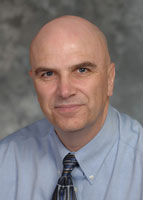 |
| Dr. Neil Burford (Abriel photo) |
The metallic element bismuth has many uses, but is best known as the "pink" ingredient in over-the-counter stomach remedies. Surprisingly, bismuth is cousin to highly toxic metals like mercury and lead, all of which have similar chemistry and mass. Unlike its toxic relatives, however, bismuth appears to have medicinal and antibiotic properties, which could be good news for people with ulcers, or just a little indigestion. Right now, the interaction between bismuth and digestive system molecules is not well understood, but Burford is adding new knowledge every day, in collaboration with Â鶹´«Ã½Â«s Department of Microbiology and Immunology, and the Division of Gastroenterology.
"We are trying to develop our knowledge and understanding of the chemistry of these elements," he explains. "We are looking at their interaction with biomolecules, which could be used to improve the interaction of bismuth with molecules in the body, or to find ways to reduce the toxic effects of lead and mercury."
Another area of Burford«s research involves the discovery of new polymers, or plastics, containing elements from group 15 of the periodic table. This group includes bismuth, as well as phosphorus, arsenic and antimony. Most of the plastics we use today are carbon-based, made from oil, a finite resource that is being gobbled up by the world«s transportation needs. New phosphorus-based polymers could eventually supersede carbon-based materials, and help ease the demand for oil.
"These new polymers have novel properties that are superior to carbon-based polymers in some ways", he says. "But it«s characterizing them, figuring out what they are and how their properties change with different compositions, that«s the challenge. We need a basic understanding first."
Although application of his research isn«t Burford«s goal, it«s a welcome benefit that pops up while searching for new fundamental knowledge. "I«m definitely excited by the idea of finding new knowledge", he remarks. "My hope is that better understanding of the group 15 elements will lead to important new materials. If we don«t develop an understanding of new chemistry, of the fundamentals, we won«t be able to deal with the critical scientific issues that face our society in the future."
In addition to the Canada Research Chair, Burford also holds a Killam Fellowship and is the Harry Shirreff Professor of Chemical Research.
